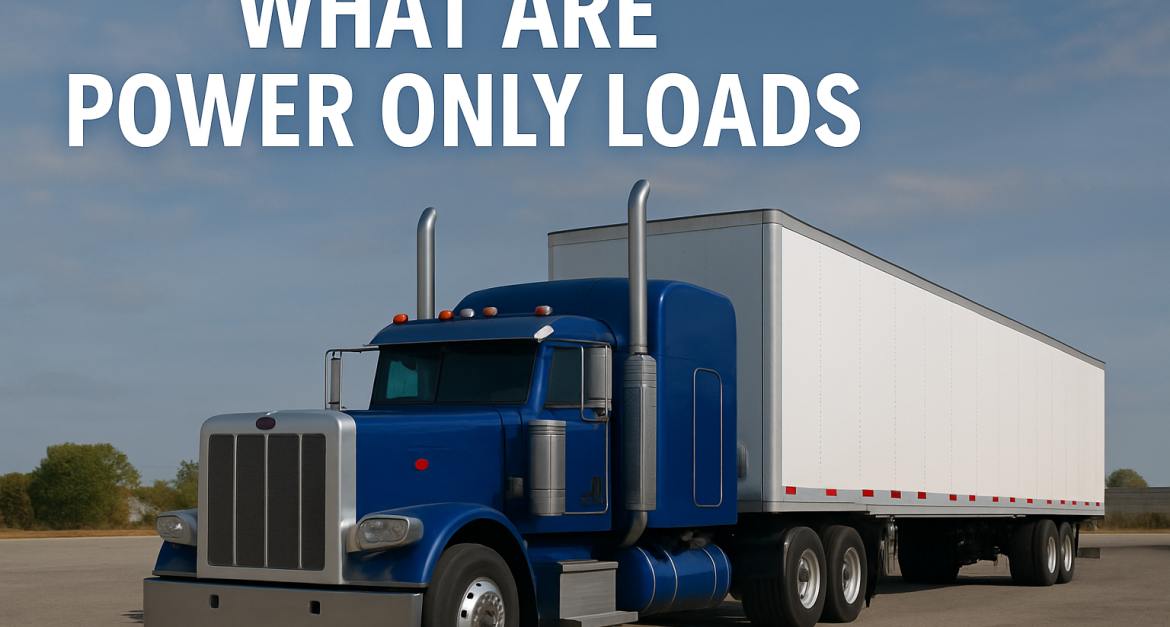
Power only loads are trucking jobs where the driver provides only the truck — not the trailer. The trailer is already loaded and waiting at the shipper’s location. Drivers simply arrive, hook up the trailer, and begin the journey. This setup is becoming more common because it offers flexibility to both the shipper and the carrier. For drivers who don’t want to invest in owning a trailer, this method saves money and reduces stress. Shippers, on the other hand, get more trucks moving their freight without needing to own a full fleet.
Why Power Only Trucking Is Gaining Popularity
One reason power only loads are getting more attention is because they fit the needs of many small fleets and independent drivers. These days, with fuel costs high and maintenance expensive, drivers want to avoid extra overhead. Power only trucking allows them to stay active without dealing with trailer upkeep or trailer insurance. With freight demand constantly changing, being able to move different trailer types also helps drivers stay flexible. It’s also useful for seasonal freight, where trailer access is more important than owning one year-round.
How to Get Power Only Loads Without Struggling
Getting regular power only loads can be easy — but only if you know where to look. Many drivers start with public load boards, but those aren’t always the best-paying options. The real money often comes from working directly with freight brokers or using a dispatcher who has access to private freight networks. When you build relationships with the right brokers, they’ll call you before the load even hits the board. That kind of connection saves time, increases your rate, and gets you rolling faster. The goal is to avoid sitting for hours refreshing load boards and chasing cheap freight.
Choosing the Right Dispatcher for Power Only Work
If you’re using a dispatching service, make sure they understand how power only trucking works. Not all dispatchers know how to book these loads the right way. Some only focus on full truckloads and don’t realize the small details that come with power only freight. A good dispatcher will ask the right questions, like whether the trailer is ready, who’s responsible for returns, and what type of equipment is required. They’ll also plan your next move before your current load ends, making sure you don’t waste time or drive empty.
Things to Watch Out for Before Accepting a Load
Power only loads may sound simple, but there are things drivers need to watch out for. Always ask if the trailer is loaded and ready to go. Some brokers won’t tell you that the trailer isn’t even in the yard yet, and that could waste hours of your day. Also, ask who’s responsible if the trailer has a flat tire or broken lights. If something goes wrong, it should be clear who pays for repairs. Another thing to check is the return process. If you have to bring the trailer back empty, those miles matter — and they need to be paid for.
How to Avoid Deadhead Miles With Power Only Freight
One of the biggest problems in power only trucking is deadhead — driving empty with no load. Since you don’t have a trailer after delivery, it’s easy to end up stuck with no freight nearby. That’s why planning ahead is so important. Before taking a power only job, you or your dispatcher should look for return loads or something close to your drop-off point. Even a short load that pays modestly is better than driving empty for free. Over time, experienced drivers learn which routes offer better power only opportunities and avoid areas where they often end up without a load.
Is Power Only a Good Fit for New Owner-Operators?
For new owner-operators who are just starting their business, power only is a smart way to stay moving without spending big money upfront. Trailers are expensive, and many banks won’t offer easy loans to new drivers. Power only lets you earn without the pressure of paying off equipment. It also helps build experience hauling different trailer types. After a year or two, you’ll understand the market better and can decide if buying a trailer makes sense. Many experienced drivers still prefer power only because of how simple and low-risk it is.
Seasonal Power Only Opportunities to Watch For
During certain times of the year, power only loads become more available. Holiday retail season, farming harvests, and construction projects can all cause a spike in freight needing quick delivery. Many companies that own trailers but don’t have enough trucks turn to power only drivers during these times. If you’re active in late fall or early spring, keep an eye out for power only freight paying extra due to high demand. Smart drivers know how to take advantage of seasonal waves and position themselves in the right states to get the best loads.
The Future of Power Only Trucking
As the trucking industry continues to shift, power only freight is expected to grow. More companies are focusing on asset-light models, which means they own trailers or cargo but rely on others to move them. Power only trucking fits into this trend perfectly. With more technology, better tracking, and stronger networks between brokers and carriers, finding and booking these loads will only get easier. For drivers, this means more opportunities to make money without increasing overhead costs.
How Brokers Handle Power Only Loads
Brokers play a big role in power only trucking. Many brokers work directly with companies that have trailers full of freight but no trucks to move them. When a broker gets these types of shipments, they look for available power units — trucks without trailers — that can take the job. Drivers who have a good reputation and respond quickly often get the best loads. If you’re working with a broker for power only freight, make sure to ask all the important questions upfront, like where the trailer is, who owns it, and if there are any delays expected. Good brokers will give clear answers and keep in touch throughout the trip. Building trust with the right broker can lead to better-paying loads and steady weekly work.
What Equipment You Need for Power Only Work
Even though you don’t need to own a trailer, power only trucking still requires the right setup. Most of these loads require a standard semi-truck with a fifth wheel to hook up to different trailer types. Sometimes, you may need special adapters, air lines, or electrical hookups depending on the trailer. It’s also smart to carry a basic repair kit and tools just in case the trailer has minor issues. Your truck should be clean, well-maintained, and ready to haul anything from a dry van to a container chassis. Having the proper insurance coverage is also important because even though you don’t own the trailer, you’re responsible for it while it’s in your care. Being prepared helps avoid delays and shows brokers and shippers that you’re professional and ready to go.
How Power Only Loads Give You More Control
One of the biggest advantages of power only trucking is the freedom it gives drivers to choose how they want to work. Since you’re not tied to one trailer type, you’re open to more opportunities and different types of freight. You can decide which routes fit your schedule, which brokers or dispatchers you trust, and how often you want to be on the road. This level of control helps drivers avoid burnout and build a work style that fits their lifestyle. Whether you want to run short local trips or long-distance hauls, power only gives you the flexibility to pick what works best for you.






